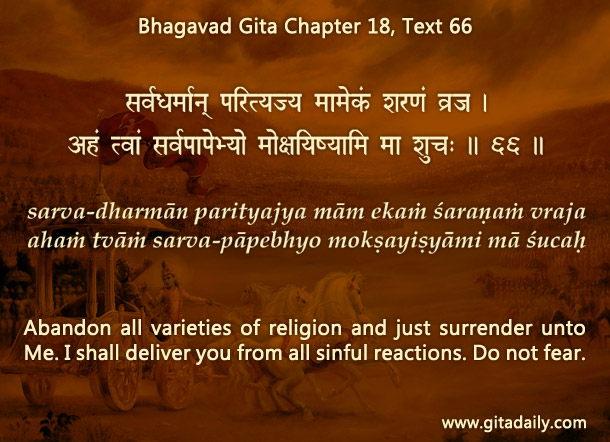When does devotion exempt us from karmic consequences? – Does the Bhagavad-gita’s concluding verse (18.66) — the surrendered are protected from karmic consequences — license ethical exemption? To understand, let’s consider the verse’s implications both contextually and universally.
Contextually, the Gita begins with Arjuna’s ethical dilemma. His dynastic duty (kula-dharma) required him to protect the members of his dynasty, whereas his warrior duty (kshatriya-dharma) required him to punish aggressors who disrupted society. When his relatives had turned aggressors, what was he to do? (02.04-07).
To answer, the Gita raises the discussion from the contextual to the universal level. Therein, it explains that we all are spiritual beings who are parts of the all-attractive Divine, Krishna (15.07). Our various ethical obligations (dharmas) are meant to help us connect with Krishna, play our part in his plan, and ultimately unite with him through devotional love. Overall, devotion enables us to maximize our contribution in this world and attain the supreme destination in the next world.
In Arjuna’s specific context, he could do his part in Krishna’s plan by fighting to disempower the vicious and empower the virtuous (04.08). As doing so required him to neutralize his relatives — an activity normally considered unethical — the Gita 18.66 granted him ethical exemption.
In this light, what is Gita 18.66’s implication? Not that we presume ourselves ethically exempt because of our devotion, but that we cherish devotional surrender as the highest ethic. Suppose we find ourselves in unusual situations that bring usual ethics in conflict with devotion. Then we need to follow Arjuna’s example by engaging in careful guided contemplation. Only then may we be ethically exempt; never are we meant to rationalize the unethical by deeming ourselves transcendental.
One-sentence summary:
Devotion grants us exemption from karmic consequences only when our devotional actions serve a purpose higher than our ethical actions.
Think it over:
- What does Gita 18.66 imply in Arjuna’s context?
- What does Gita 18.66 imply universally?
- Have you ever neglected the ethical by deeming yourself transcendental? Were you actually serving a purpose higher than that served by being ethical?
***
18.66: Abandon all varieties of religion and just surrender unto Me. I shall deliver you from all sinful reactions. Do not fear.
To know more about this verse, please click on the image


Sublime explanation. Thanks